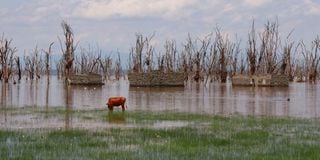Court stops county from disposing toxic waste into Lake Nakuru

A cow grazes on the shores of Lake Nakuru on 26 May 26, 2024. The lake's waters have risen, displacing dozens of residents of Mwariki village in Nakuru County.
The Environment and Lands Court has, in a landmark ruling, halted the disposal of toxic waste and industrial chemicals into Lake Nakuru.
Justice Anthony Ombwayo ruled that the Nakuru County Government, the Nakuru Water and Sanitation Services Company (Nawassco), and the National Environmental Management Authority (Nema) were responsible for polluting the lake through waste discharge.
The judge on September 26 issued a permanent injunction stopping any further discharge of solid and industrial waste into Lake Nakuru by the county.
The ruling is a major win for environmentalists and conservationists in protecting Lake Nakuru, a UNESCO World Heritage Site, and ensuring that responsible waste management practices are enforced to safeguard the environment and wildlife.
Judhe Ombwayo also directed the devolved government to find an alternative site for the disposal of all solid waste and industrial chemicals, ensuring they are kept away from the lake.
“A prohibitory injunction is hereby issued to the respondents, permanently restraining any further refuse disposal into the Lake Nakuru basin,” ruled Justice Ombwayo.
The orders followed a petition by Baboon Project Kenya, an environmental conservation group, which sued the Nakuru County Government, Nawassco, Nema and the Attorney General.
The petitioners accused these entities of permitting the continuous dumping of both solid, liquid, and toxic waste into the lake, causing significant harm to wildlife and the lake’s ecosystem.
Through an affidavit submitted by the organisation's chairperson Gichohi Simon Mbuthia, the petitioner emphasised the negative impact on baboons within the Nakuru National Park.
According to Mr Mbuthia, the baboons and other animals still drink from the polluted lake, further exposing them to the harmful effects of the contamination.
Mr Mbuthia accused the county of failing to adequately treat and recycle waste, instead allowing it to flow unregulated into the lake.
He further argued that Nema had failed in its mandate to ensure sustainable management and conservation of natural resources.
The petition called for the establishment of systems like environmental impact assessments, audits, and monitoring to prevent activities that endanger the environment. H
owever, the petition noted that these duties had not been adequately discharged by the respondents.
“There is a compelling need to establish systems of environmental impact assessment, environmental audit, and monitoring of the environment aimed at eliminating processes and activities likely to endanger the environment,” the petition stated.
n its defense, Nawassco denied responsibility for the disposal of industrial chemicals and toxic waste.
The company's managing director James Ng’ang’a argued that the wastewater discharged from their treatment plant is safe and meets the required environmental standards. He maintained that after the rigorous treatment process, it is unlikely for solid waste to end up in the lake.
However, the court found that the respondents bore a significant responsibility in managing and protecting Lake Nakuru and noted that this responsibility had been neglected.
The court highlighted a report presented by the petitioners, which revealed that pollution from solid waste and industrial chemicals was linked to the presence of heavy metals in fish from the lake.
“I have perused the final report on assessment of the fish species diversity and water quality in Lake Nakuru in Kenya and the Eco –toxicological study of the potential role of heavy metals in fish die off and do that the water quality in Lake Nakuru has degenerated due to organic pollution from domestic waste water, storm runoff and industries,” noted Justice Ombwayo.
The judge further issued a restoration order against the Nakuru County Government, requiring immediate action to restore Lake Nakuru to a healthier state.




